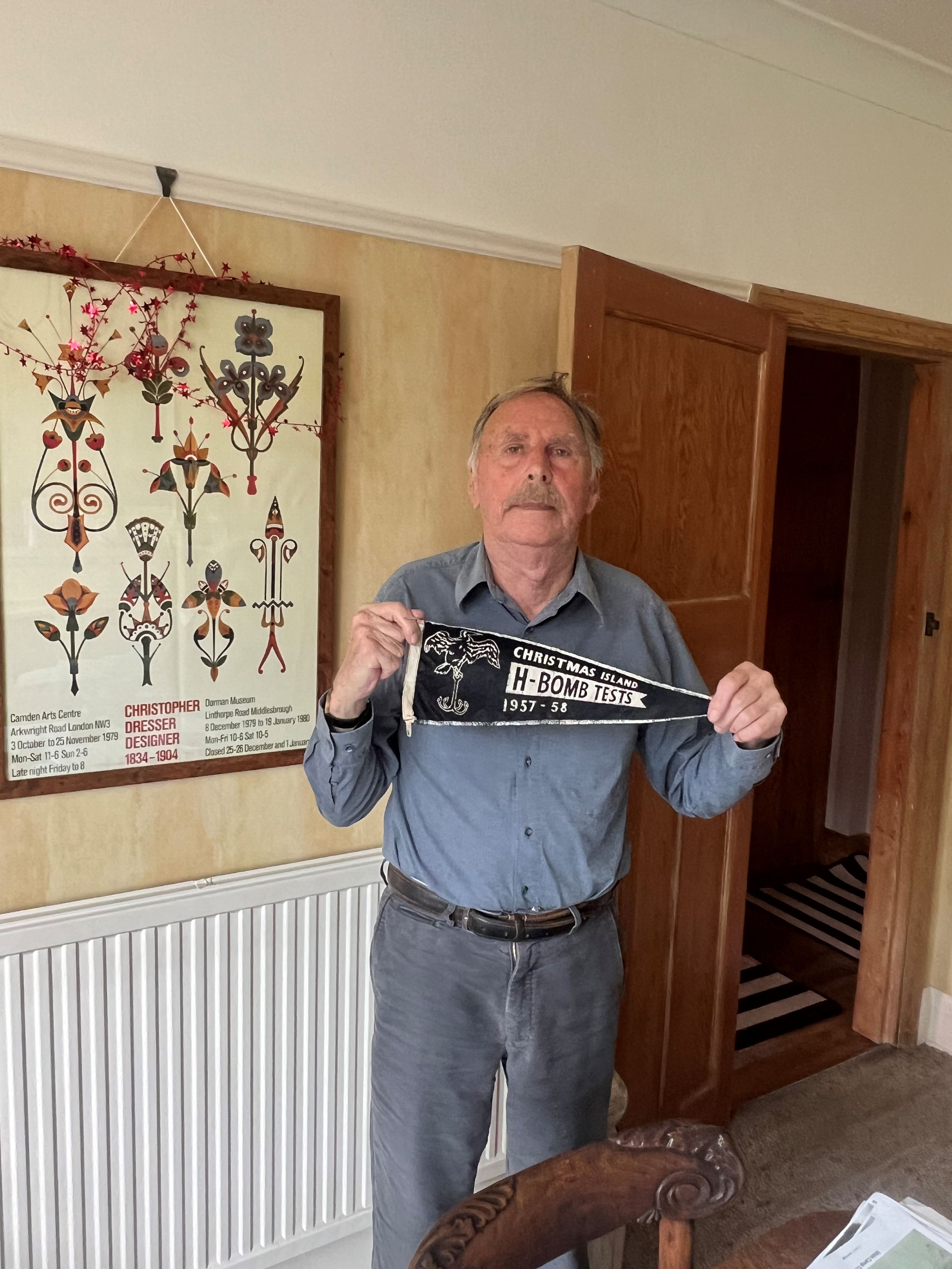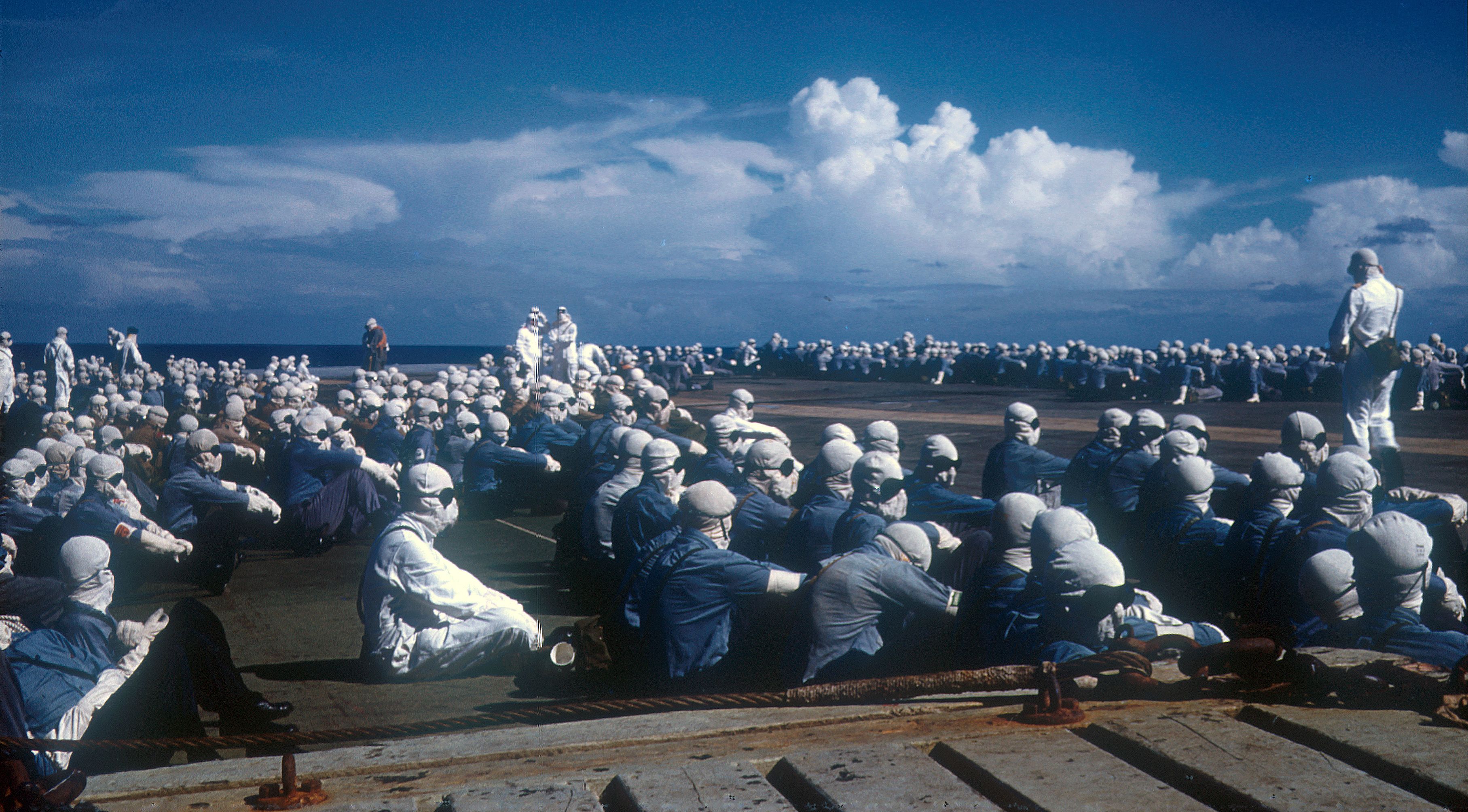
Alan Dowson was born in Middlesbrough in 1938. He left school at 15 and started an apprenticeship as a grocer. In 1956, Dowson was called up for National Service and joined the Royal Air Force. He was posted to Christmas Island for Operation Grapple in 1958. Here, Dowson worked as a barman waiter in the officers’mess and witnessed four nuclear weapons tests. Upon returning home, Dowson returned to education and completed his O levels, A Levels and then an undergraduate degree at what is now Nottingham Trent University. He spent his career in adult education and completed a Master’s degree and a PhD. Dowson is a lifelong Labour member and has served as a councillor in his local ward in Peterborough. Between 2022 and 2023 he served as the Mayor of Peterborough. He was married to Annie from 1967 until her death in 2021.
Interview extracts
Description
In November 1956, during the Suez Crisis, Alan Dowson was signed up for National Service in the RAF. Here he was assigned one of the lowest ranks. Observing officers, who were often less capable in life skills despite higher education and rank, sparked Dowson’s interest in class and societal hierarchy. This experience instilled in him a lifelong passion for education. Dowson later attained a doctorate and ran adult education courses in Peterborough, where he also served as a Labour mayor.
This is a short extract from an in-depth interview. Alan Dowson was recorded for the Oral History of British Nuclear Test Veterans project in 2024. The interviewer was Christopher R Hill. This project was run in partnership with National Life Stories and the full interview can be accessed at the British Library.
Transcript
November 1956. At the same as we attacked Egypt, it was the Suez Crisis on at that time, but I had no thoughts about aspirations or that. And in the Air Force they have twenty grades and my educational levels were not very high, and I think grade one is a pilot and grade twenty is a dustbin emptier on the camp. I was grade nineteen, so I was a waiter and cleaning of kitchen utensils and being in the officers’ mess to polish officers’ shoes. And that I think started to stir my thoughts about hierarchy in society. Here I was doing the bodgy jobs for people who were same age as me, but they’d been to university or to grammar school, and they were officers, and many of them, they were paper qualified but they were quite dim as how life, what about life and looking after yourself. And I thought, well, I can do better than them.
[ends at 0:01:39]
Description
Alan Dowson discusses a class action against the Ministry of Defence, where the claimants were unable to gain access to their medical records. He describes how he thinks the legal system is unfit for dealing with veterans’ appeals, referring to cases going back to the Second World War. After returning from Christmas Island, where he served as a National Serviceman for the RAF, he became increasingly involved in politics, particularly through the Labour Party and the Campaign for Nuclear Disarmament (CND), which he joined after returning home from Christmas Island. In later life, he served as Mayor of Peterborough. Dowson is a firm believer in investing in people’s education and the public sector.
This is a short extract from an in-depth interview. Alan Dowson was recorded for the Oral History of British Nuclear Test Veterans project in 2024. The interviewer was Christopher R Hill. The project was run in partnership with National Life Stories and the full interview can be accessed at the British Library.
Transcript
In the ‘70s, we were taking the class action, and they wouldn’t, they declined to reveal our medical records because of secrecy. I think the records would have been more useful for museums than the Russians.
Yes, yeah.
You know what they had to say, but they weren’t interested. You sit there on the beach, pull your sleeves down and wear a floppy hat and look away from the bomb. They didn’t care a monkeys for it. I don’t know what happened to the officers and senior ranks. For the civilians, they would get OBEs and medals from the Queen at the time. For senior officers, they would get their medals as well. In Wilson Street we had one of the blokes from the Burma railway and there he was coughing his guts up, you know, for four years, in the side street. He died obviously, because he wasn’t recognised. The no award for the treatment. So, we were treated the same as many of those people in the Second World War. The system doesn’t work really, and the system for the veterans is… in the next ten years we’ll all be dead, right? And they’ll be gone. But, for the next four, five years, there’s something the government could do by helping them, and it wouldn’t cost them, but it will cost them something at the moment. So, each six months goes, we lose about twenty or thirty people who die, and that’s removed from the calculation.
And you joined CND, when did you become interested in joining CND?
When I joined Labour. Yeah. Must have been ‘61 when I came back from Christmas Island. I used to start off speeches at meetings. I’m the only one who’s actually seen bombs go off, you boys don’t know what it’s like. Now I've had a rich, varied experience.
[ends at 0:02:43]


